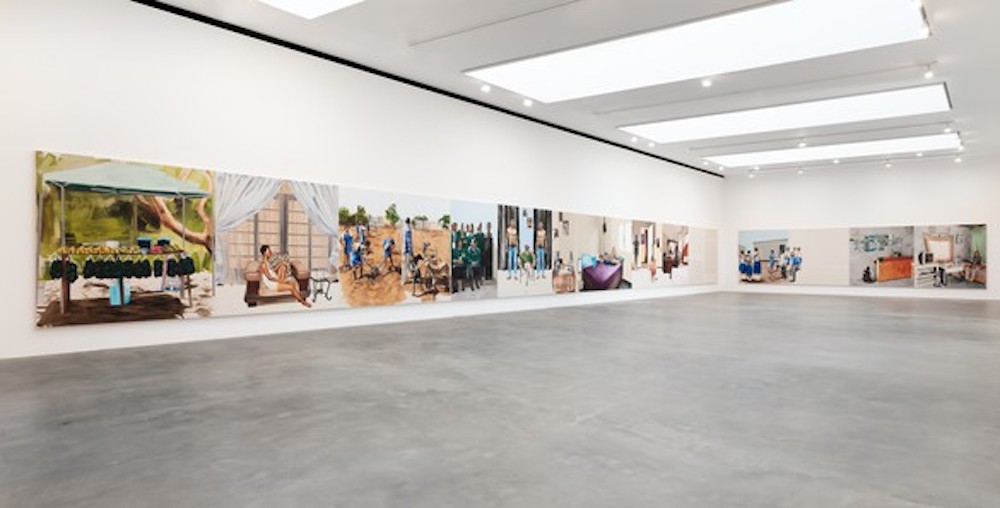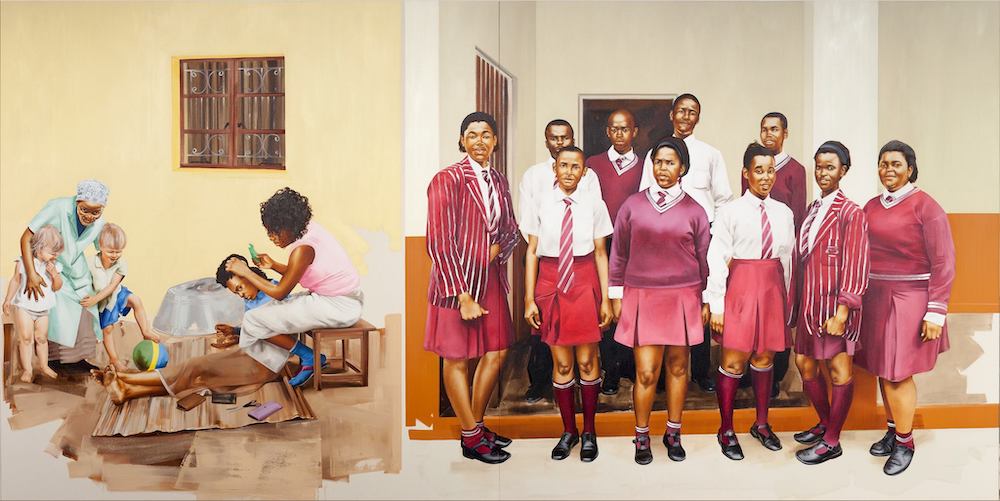Meleko Mokgosi - Democratic Intuition | Gagosian
I’ve always found the amount of security guards at Gagosian galleries a bit over the top. And even more so this visit, with London fresh out of lockdown and the city’s residents more likely to catch up on their Christmas shopping than catch up on new exhibitions on a Saturday afternoon. That, coupled with the fact the gallery’s gone appointment-only, meant that I had this show all to myself. Well, more accurately, I shared each room of Gagosian’s massive space on Britannia Street with a black mask-and-suit clad guard - and nobody else.
The size of the gallery’s definitely befitting of the grand scale of Meleko Mokgosi’s work. The 21 panels that fill the walls of the main room is only one part of the grand project known as Democratic Intuition. This project, begun by the artist in 2014, aims to demonstrate that, while democracy is something to strive for, it’s also not naturally compatible with human nature.

Or, more specifically, Mokgosi says: “Democracy is incompatible with structural racism and institutionalized or systemic violence; democracy is incompatible with neocolonialism and neo-imperialism; democracy is incompatible with the instruments that reproduce the conditions for and possibilities of capitalism; democracy is incompatible with race discourse.”
Across these 21 panels, featuring everyday scenes from southern Africa, girls and women are at work, men are at leisure. The scenes of everyday life are freighted with political concerns: schoolgirls are portrayed, in acrylics and oils on raw canvas, doing hard manual labour. A Black nanny embraces white children. A young boy reclines in a wicker chair, clad in sunglasses and flanked by two older shirtless boys. Taken together, these scenes of everyday life attain grandeur; a grandeur that comes as much from the sheer scale of the work as its political concerns.

The politics is made much more explicit in Mokgosi’s “word paintings”, a group of which shows pages of exhibition books and wall notes, drawn mainly it seems from wall notes and books about European artists’ response to art from the global south: Gauguin of course, Dada and the Fauvists.
In their bohemian milieu, one note on the Expressionists trills, the German artists felt tribal styles symbolised a whole alternative way of life, opposed to traditional standards of beauty, free form Western rational values, and sexually liberated. Mokgosi paints his angry, handwritten marginalia, revealing to the (oblivious, white) viewer the offensiveness of this sentence in its complacency - and worse. “This is racist and very upsetting,” Mokgosi writes (or paints).
“Europeans reduced anyone who is not European to the level of being primitive - producing a metaplan of otherness that serves to only confirm European expectations of the exotic rather than to challenge those assumptions.” Take that! Mokgosi’s point is undeniably true - tribal art, produced by anonymous “naive” Africans is always in the background of most western discussions about Dada for example. These artists are decorative, portrayed as bit part players in the psychodrama of the Europeans who repurposed their art. The African artists’ agency is denied - hardly democratic.
My discomfort at having consumed all these wall notes, all that art commentary, that came from a similarly complacent and racist point of view, and not thought twice about it, was sharpened by the fact that, as I read, I was being coolly scrutinised by a Black security guard, who occasionally shifted from foot to foot. Can’t Gagosian given them at least a chair? The mainly white art students who ‘guard’ the galleries at White Cube and Hauser & Worth, two slightly less huge but still big private galleries, get chairs and can also read a book. Something complicated about labour and reward came into my mind, and wasn’t resolved. Maybe it’s a question of democracy.
As Mokgosi told an interviewer: “How can we—without majorly philosophizing it and making it an academic thing—how do ordinary people understand this thing of democracy? How do we have access to it? Who has access to it and who doesn’t?” I’m not sure if this project gets us all the way there. And sometimes it takes us a little further away (one word painting tries to explain away western feminism as incompatible with African life, for example).
But, no viewer can help to admire the scale of Mokgosi’s artistic and intellectual achievement - or the grandeur of his purpose!
Meleko Mokgosi: Democratic Intuition is at Gagosian (London). 29 September - 12 December 2020